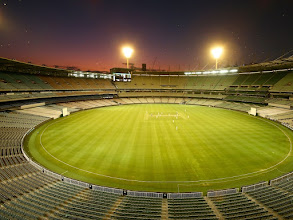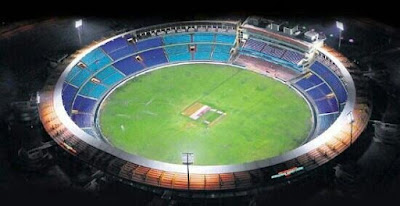10 biggest cricket stadiums around the world
1.
Narendra Modi Stadium, Ahmedabad, India
 |
| Image from Hindustan Times |
 |
| Image from Business Line |
Furthermore, the structure does not require
any columns which give viewers an unobstructed view of the stadium from every
point. The stadium is designed in such a way that the lower levels are used for
smaller events and it has a skywalk connection to the nearest metro station to
tackle road congestion.
2.
Melbourne Cricket Ground, Melbourne, Australia
 |
| image from Cricket365 |
Locally known as “The G”, it has a capacity of
1,00,024. It was built in 1853 and has hosted a multitude of important sports
events like the 1956 Summer Olympics, 2006 Commonwealth Games, and the 1992 and
2015 Cricket World Cups. The stadium provides stunning views of the city and
into Yarra Park.
The roof made of glass and metal shelters three grand glass atriums leading to the three entr
 |
| Image from NDTV Sports |
ances. A new feature of the
renovated stadium is the expansion of the Australian Gallery of Sports which is
now a part of the National Sports Museum which also features interactive
devices.
3.
Eden Gardens, Kolkata, India
 |
| Image from IPL Cricket Match |
Established in 1864, it is the oldest cricket
stadium in India which is why it is called “the Mecca of Indian cricket”. It
has a spectator capacity of 66,349 and has hosted the World Cup and Asia
Cup.
It was named after the Eden sisters of Lord Auckland, the then governor-general of India, and the stands were named after prominent cricketers and soldiers of India.
4. Shaheed Veer Narayan Singh International Cricket Stadium, Raipur, India
 |
| Image from TripAdviser |
It was built in 2008, with a seating capacity
of 65,000. It is the second home venue for the Indian premier League team Delhi
Daredevils. The stadium is named after Veer Narayan Singh Binjhwar, a
landlord from Sonakhan who spearheaded the 1857 war Indian independence in
Chhattisgarh.
It has newly updated facilities and is
considered one of the best sports grounds in the country despite not having
hosted an international event yet.
5.
Perth Stadium, Perth, Australia
 |
| Image from CricketCountry.com |
Perth is a multipurpose facility built in 2017 that has a seating capacity of 60,000. It has hosted multiple important sporting leagues as well as large-scale cultural events and concerts. Its location is adjacent to the Fremantle sea, allowing the users to enjoy not only the vista but also the breeze to fight the scorching heat.
The stadium was a project that rejuvenated the waste ground of the city and converted it into a vibrant and lively park and cultural hub.
6.
Rajiv Gandhi International Cricket Stadium, Hyderabad, India
 |
| Image from Rethinking the future |
Home to the Indian Premier League team
Sunrisers Hyderabad, it has a capacity of 60,000 spectators. The proof that
Indians consider cricket a religion, is clearly reflected by the fact that
there is a temple inside this stadium to ensure that the home team does not
lose the match. The stadium was considered to be jinxed for the team due to
incorrect orientations of the dressing rooms according to Vastu
Dosham (Hindu architectural design outlines).
After fixing that and adding a temple, it is
believed to have turned their luck around since the team almost always wins in
their stadium.
7.
Greenfield International Stadium, Trivandrum, India
 |
| Image from Onmanorama |
Built in 2014, with a spectator capacity of
55,000, it was India’s first DBOT model outdoor stadium. This implies that
the Kariavattom Sports Facilities Limited (a private company), owns the
ground for the first 15 years and is on lease by the Kerala Cricket Association
(governing body).
It also has facilities for indoor sports like table tennis, badminton, volleyball, an Olympic sized swimming pool, along with a spa and a clubhouse.
8.
Jawaharlal Nehru Stadium, Kochi, India
 |
| Image from Genius&Gerry |
Built in 1966, it is a multi-purpose stadium
that also has a capacity of 55,000 spectators. The stadium’s unique feature is
its roof which is made of high corrosion and oxidation resistant Galvalume
sheets with M.S. trusses.
Furthermore, the roof holds the potential of
housing solar panels to help power the stadium facilities, which will be
installed soon.
9. DY Patil Sports Stadium,
Navi Mumbai
 |
| Image from Playo |
Built in 2008, DY Patil Stadium also has a capacity of 55,000 spectators and was designed by Hafeez Contractor. Since its opening, the stadium has hosted multiple IPL matches and is the home to the IPL team Mumbai Indians. It has also hosted notable cultural events such as concerts.
The unique feature of the stadium is that it
has a cantilevered full wing roof, which ensures unobstructed view for all. The
roof is made of a fabric imported from Germany.
10.
Adelaide Oval, Adelaide, Australia
 |
| Image from ESPNcrickinfo |
It was built in 1871, with a spectator capacity of 53,583. The stadium has grown to become a landmark in urban design and an icon for sports architecture in Australia. The site was an existing social and cultural buzzing that has enhanced since the stadium’s construction.
The stadium is perceived as three pavilions, each of which responds to the surrounding site, the gaps between the pavilions provide views and connection to its context to break the conventional introverted nature of a stadium.
This article appeared on rethinkingthefuture.com
Credit goes to the original writer







No comments